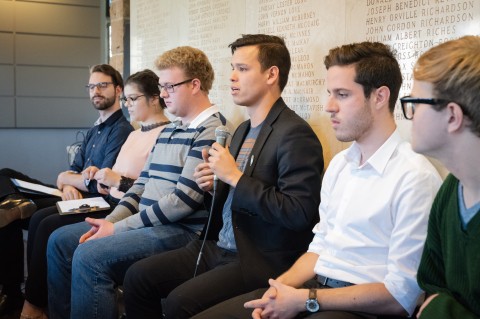The by-election for the University of Saskatchewan Students’ Union president came and went, leaving a miniscule mark in the hearts of the students. In my opinion, it was a bitter-but-not-so-sweet election considering that 2,762 out of 18,175 undergraduate students voted.
In this by-election, over 500 more students cast their votes than in the general election in March. Considering this marginal increase in voters, students express their skepticism in the platforms of the candidates.
Nadia Ristau, a first-year arts and science student, says that, while she didn’t perceive any particular platform to be a standout, a lack of preparedness seemed like a consequence of the brief nature of the by-election.
“I felt like most of the candidates were trying very hard to people please with their platforms… Given the time frame, it is understandable though,” Ristau said.
However, David Hartman, a second-year Edwards School of Business student, points out that, although the campaigning period was fast, many of the platforms presented by the candidates, Hartman argues, were connected to the events of the last election.
“While I recognize that they did not have a lot of time to prepare these platforms, a lot of them were reactionary to the last year’s events during the previous election,” Hartman said. “I feel like more effort needed to be put into establishing devices in why their points are important to the students of the U of S.”

2018 USSU presidential candidates answer questions at a Q&A hosted by the Sheaf Publishing Society on Oct. 17.
Some of the candidates’ platform points were about finding different measures to help survivors of sexual assault, violence and harassment.
Aqsa Hussain, a second-year political studies student, says that she didn’t think all of the candidates were informed on the situations at hand, although they continued to
speak about it anyway.
“There were a lot of people bringing up sexual assault without actually understanding what it was or how to deal with it,” Hussain said.
Yashica Bither, a second-year physiology and pharmacology student, says that, even with the USSU, there are students or student groups that are
under-represented, such as international students.
“[International students] may not be here very long, … but they are still part of our university, even if it is for a short amount of time, … and I don’t know what the USSU has in mind for something like that,” Bither said.
The platforms presented by each candidate for the by-election, which included items such as sexual-assault prevention and mental-health awareness, were already part of Rose Wu’s responsibilities as this year’s USSU vice-president student affairs.
“I’m not sure what kind of debriefing they got about the position, but I felt that some of the candidates didn’t understand the roles and responsibilities of the positions,” Ristau said.
The campaigning period was a meagre three days long — in an institution of more than 18,000 undergraduate students, this was not enough time for everyone to partake in the voting. The news of the by-election did not even reach some students.
Jade Allard, a third-year environmental engineering student, was unaware that a by-election took place place.
“Oh, damn,” Allard said. “That was a thing that happened?”
Further, Allard says that the reason she may have missed out is because of her lack of interest in USSU affairs entirely.
“Maybe if I had another four years at the university, I would care more about what happens with student politics,” Allard said.
Allard might not be alone in this apathy — personally, the by-election was an anticlimactic event. Campaigning was already at a disadvantage due to time constraints, something that was certainly noticeable in the haphazard platforms.
After speaking with other students, I have come to realize that a core problem was the candidates’ lack of understanding surrounding the role of the USSU. Unfortunately, the candidates may have favoured buzzwords over substance and failed to listen to the demands of students, leaving many voters disinterested.
—
J.C. Balicanta Narag
Photo: David Hartman